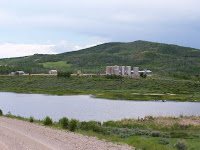
As many of you know, I work in the oil and gas industry. Mind you, I am in an administrative role, but I am still very involved in the industry. I have been working in oil and gas for about 7 years and I have repeatedly heard the terms Dakota and Frontier in relationship to geological formations and the locations of oil and gas deposits.
This weekend, we took a drive around our area and were noticing some of the geological features of this beautiful landscape. I made the observation that the four gas plants that are located in our area were all located on the top of high "hills".(some would call them "mountains") I know that this is done because H2S (Hydrogen Sulfide) is heavier than air and will settle in the low ground, thus allowing personnel to seek "higher ground" for safety.
I wondered if there was another reason the plant and fields were built in mountainous areas and if this might be connected to the Frontier and Dakota question previously asked.
After asking many questions and driving my co-workers crazy I have come to the following conclusion. Oil and gas were formed millions of years ago by the earth's moving and changing ways. These deposits were formed in alot of different terrians, such a flat land, hilly, and mountains regions. In our particular region, they were formed when the earth shifted and placed one slab of earth on top of another, forming what we call the Overthrust.
Within the Overthrust, there are various different geological formations. All of these formations are unique in their qualities, thus they are called by different names. Some of the names in this area are the Madison, the Frontier and the Dakota.
So, in conclusion of this ultra boring post, I have to say that, while probably not interesting to many of my readers, this Frontier and Dakota issue did invoke some interesting questions for me. It also helped me to realize that if we sit in our living room in front of the TV, we are not going to notice the interesting rock formation or the way that a small bird follows and pesters a hawk.
We are less likely to have questions about the world around us if we don't get out and see the world around us.









